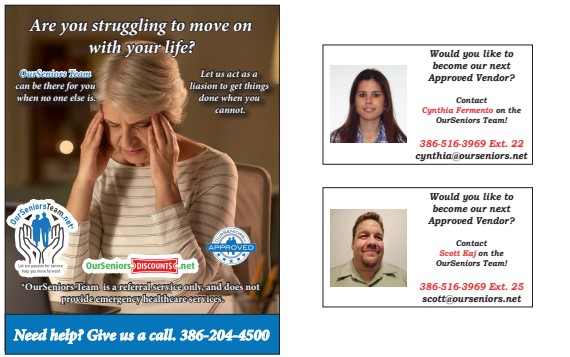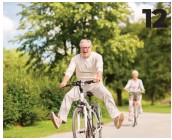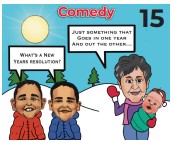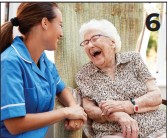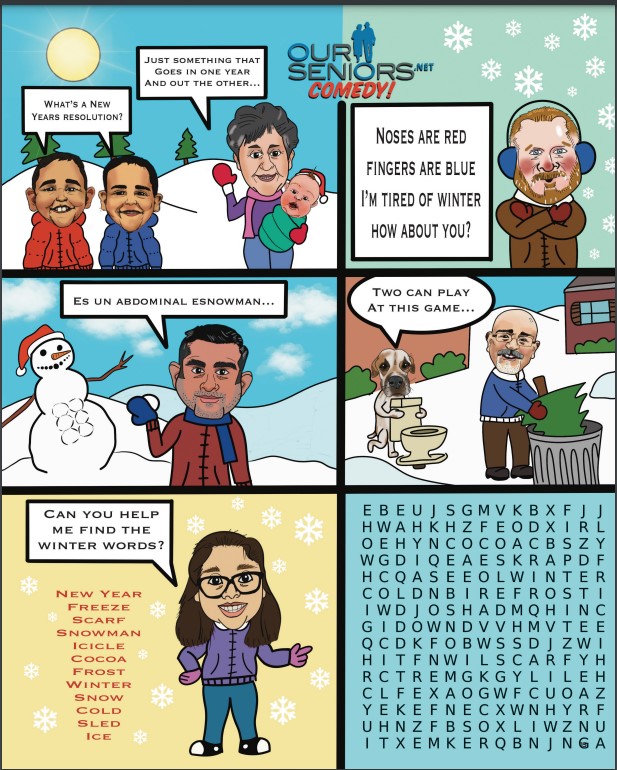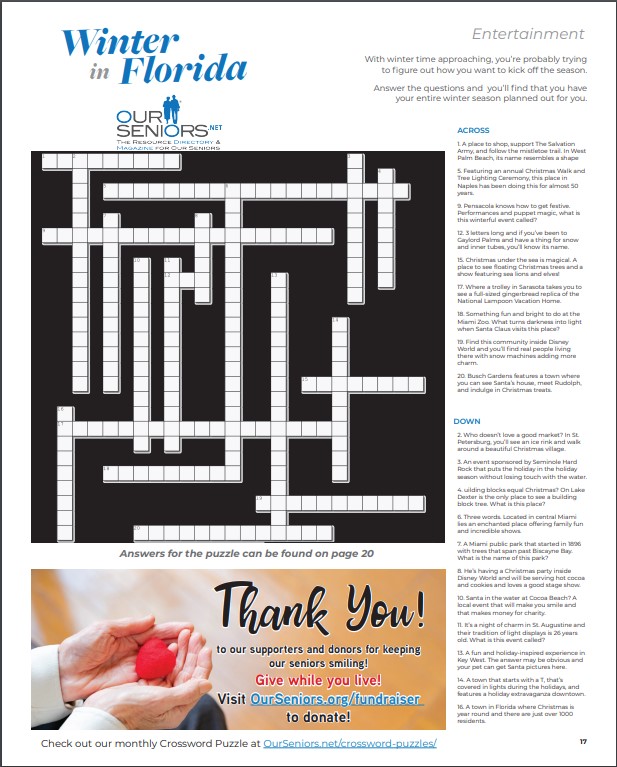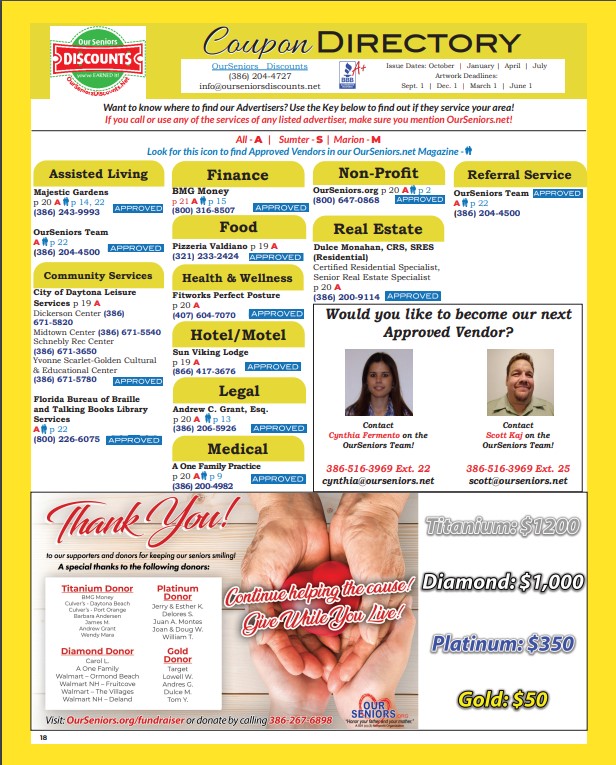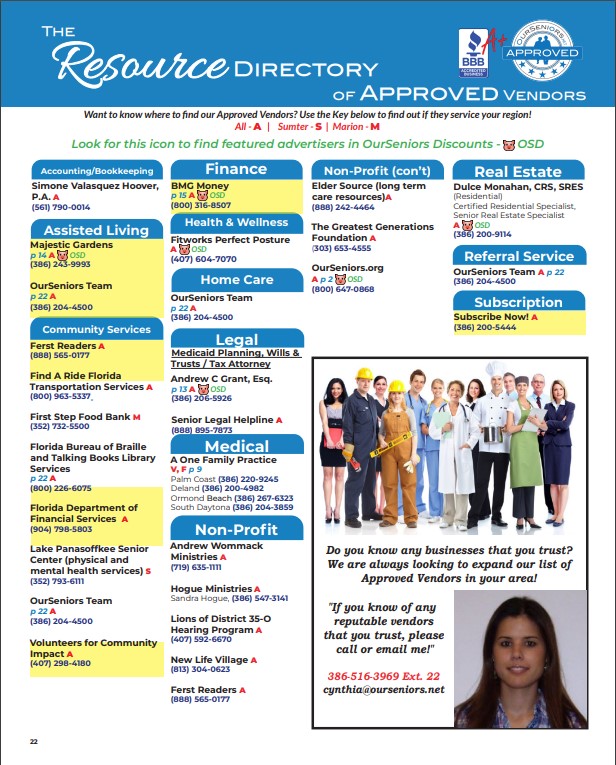The Villages Florida, Winter 2023

The Villages Florida Winter 2023 Edition – OurSeniors.net Magazine
There are plenty of seniors that reside in The Villages. The majority of those seniors love and follow OurSeniors.net Magazine. Yes Happy New Year to all and make sure you check out OurSeniors.net Magazine The Villages Florida Winter 2023 Edition at https://ourseniors.net/
Contents
Winter 2023 | Volume 7 / Issue 1
In the News
4| QuePasaOurSeniors.Net: Addressing Florida’s Senior Lifestyle Spanish-Speaking Community
23| OurSeniors.org Is A Nonprofit Assisting Hundreds Of Seniors In Florida
Community
6| The Benefits of Volunteering and Giving Back in Seniors
Entertainment
15| OurSeniors Comedy/ Word Search
17| Crossword Puzzle
Finance & Retirement
10| Seniors & Credit Scores
Health & Wellness
7| Hope For An Alzheimer’s Disease Treatment
16| Seniors and Diet: Paleo, Vegan And Mediterranean. Are Any Of These Good For You?
Home & Living
14| Differences Between an Assisted Living Care Facility And A Nursing Home Facility
Inspirational
5| Financial Stewardship: The Least of These
13| A Curtain Call For Some Amazing Seniors
Insurance
8| How Do Advantage Plan Star Ratings Work?
Legal
12| Planning For When, Not If. Strategies For Long-Term Care Needs
Don’t miss another edition by donating! Visit OurSeniors.org/donate
Disclaimer: The information published in this magazine and our website is intended for residents of the USA. The opinions, beliefs and viewpoints expressed by the various authors in this magazine and on this web site do not necessarily reflect the opinions, beliefs and viewpoints of OurSeniors.net Magazine or official policies of OurSeniors.net Magazine, OurSeniors Radio, OurSeniors Discounts, OurSeniors.org, Inc. and or its related entities. It may contain general information about medical conditions, public and private health service organizations and other third-party information including but not limited to testimonials. The information is not advice (legal, medical or otherwise) and should not be treated as such. Consult your licensed Professional such as Attorney and or Doctor etc. for further advice. No claim is made as to the accuracy, authenticity or completeness of any information and, is often provided in a generalized or summarized format for brevity. OurSeniors.net Magazine, LLC and or its subsidiaries, does not accept any liability for the information (nor for the use of any information) provided by this magazine and or website. The information presented by this magazine and website is provided on the basis that all viewers undertake responsibility for assessing the relevance and accuracy of the data related to their circumstances. Thank you for reading our magazine and visiting www.OurSeniors.net and please contact us if we can be of further assistance. All real estate advertised in OurSeniors.net is subject to the Federal Fair Housing Act. This federal law makes it illegal to advertise any preference, limitation or discrimination based on race, color, religion, sex, handicap, familial status, or national origin, or intention to make any such preferences, limitation, or discrimination. We will not knowingly accept any advertising for real estate which violates the law. All persons are hereby informed that all real estate advertised in OurSeniors.net is available on an equal opportunity basis. Information contained herein has been furnished by community owners, managers and agents. OurSeniors.net and or OurSeniors.online, OurSeniorsDiscounts.net and or OurSeniors.org, Inc. and OurSeniors.net Magazine, LLC do not make any representations as to opinions and facts. All terms and conditions of rentals are subject to change. OurSeniors.net reserves the right to refuse advertising space to anyone deemed unsuitable for placement in this publication. OurSeniors.net, OurSeniors.online, OurSeniorsDiscounts.net and or OurSeniors.org, Inc., and OurSeniors.net Magazine, LLC retains all rights reserved by copyright 2023 OurSeniors.net, and or OurSeniors.net Magazine, LLC. This publication or parts thereof may not be reproduced in any form without the written permission of the publisher. For further Disclaimer information please visit https://ourseniors.net/ and click Disclaimer on the footer of the website. Please note that websites and links are referenced in the magazine and you may have complete access to our online version by visiting. www.ourseniors.net/editions.

Dear OurSeniors Readers, Subscribers and Donors,
The New Year is here and if you weren’t already aware, New Year’s Day is the most celebrated holiday across the globe. This may be because everyone goes into the new year together and regardless of our resolutions, everyone is pushed into a new time, a new moment where time seems to reset. This holiday is like a marking of a new chance, and it represents a period in which we can all recognize the previous year’s achievements, failures, memories, significant moments, and newly made connections.
As we progress through the rest of winter and into another season, 2023 is an opportunity to do things differently, to expand on our ideas that we had in 2022, to achieve new goals, and to carve our resolutions into what we will use to drive us through the year ahead. Along with another new year comes new beginnings and a fresh start but the question is, what are you going to plan to pursue in 2023?
It’s a New Year!
The marking of a new year means more than just another 12 months. Caesar instituted January 1st as the “start of the year” as part of a reform and the reason for this was to show honor for Janus who was the Roman god for new beginnings. Janus’ two faces gave him the power to take a look back into the past and to look into the future and this inspired the symbolization of the holiday we know today.
As the new year starts to set in, the dynamic for resolutions and how to celebrate them varies for different people. Some will set weight loss goals or goals focused on career enhancement or retirement. Some also emphasize ways to prepare themselves to bring in the new year such as treating themselves to time at the spa, starting a new book, setting off on a trip, or finally launching a groundbreaking business idea right away. No matter how you decide to celebrate or prepare, new beginnings are different for everyone.
New Beginnings Are Meaningful
What does a new beginning mean for you? Does it mean taking control of health problems and leading a healthier lifestyle? Does it mean doing more with family and putting more effort into reestablishing relationships? Or does it mean doing things that you’ve been putting off for months or even years and finally doing them like learning a new language, going for a new job, or volunteering for a cause that you support?
The thing to realize is that new beginnings represent new hope and what this does is motivate action into things that you may have been stalling on. New year resolutions and celebrations are chances to see the light and optimism that come with doing the things that get you closer to your family, your goals, and your interests.
Time for a Fresh Start for New Opportunities
New opportunities mean change and change is something that we should embrace. Oftentimes, a fresh start leads to increased strength, personal improvement, flexibility, and self-progress. What we hope you take from a fresh start is that the “fresh start effect” is very much real and affects different people, differently. No matter what that means for you, your friends, family, and those around you, it can result in anything that you believe it can.
As you lean further into what 2023 has in store for you, OurSeniors team will be doing the same and we hope to have your support and for you to extend your ideas if there is something that you would like to see us do for the community, to see us add to the OurSeniors magazine, or to experience with us as we continue spreading knowledge about a wide range of interests with the help from leaders in our communities. Happy New Year to all and remember that we need your support yes, we are a 501 (c) (3) not-for-profit. If you enjoy this publication, all we ask is that You give while you Live!
Finally, we are dedicating this Edition to our beloved Friend, Vendor, Subscriber and Donor Barbara Andersen who just recently passed away. She was truly an Amazing Senior and yes we will miss her, she was 84 years young and you can see more about her here:
Julian G. Cantillo, L.P.N, President and Founder of OurSeniors.net Magazine


Since 2016, OurSeniors.Net has been providing informative and entertaining reading content through our online magazine for seniors and our print magazine for seniors. We touch upon everything from Exercise, Diet, Healthcare, Healthy Living, and a plethora of other interesting subjects our readers make senior living in Florida the best it can be.
In just over six years, our senior publication has come to cover the majority of Florida. We customize our senior publications for six regions (North East Florida, The Villages, Central Florida, Tampa Bay, Southeast Florida, and Southwest Florida). In October 2022, we launched Spanish language editions serving Northeast Florida and Central Florida. We’re calling it the “Que Pasa OurSeniors” edition and will help us reach the state’s Spanish-speaking communities.
The first edition of “Que Pasa OurSeniors” pays respect and homage to Miami’s Cuban-American heritage by remembering the popular television sitcom “Que Pasa U.S.A.” which aired in the late 1970s and early 1980s. The show was a huge success among Hispanic audiences and many of the show’s cast and crew members are still tied to the Miami area.
“Que Pasa OurSeniors” is a natural step for our staff because so many of us are rooted in the bilingual culture that has given Florida its unique flavor. By publishing informative and entertaining stories in Spanish our services, which include carefully vetted legal, health, and maintenance service providers from around the state, are reaching thousands of more residents than we were when we launched our non-profit six years ago.
If you are a business owner or professional who wants to expand and reach the Spanish-speaking community in one of our bilingual formats (online and print), we offer a promising opportunity to do so. Each year we grow our subscriber list and bring valuable resources to an ever-important senior and retiree community. And we look forward to partnering with reputable entities that share our values.
OurSeniors.Net is committed to helping senior living Florida enjoy their golden years. We partner with trustworthy and reputable service providers throughout the state who can assist seniors in a variety of ways. And unlike other senior citizen publications, our new “Que Pasa OurSeniors.Net” editions allow us to give these service providers a chance to reach more people in Florida so that they can grow their brands and promote their businesses in English and Spanish. If you are a service provider who wants to learn more about our branding opportunities, call Cynthia Fermento at 866-333-2657 ext. 2 to learn more.



Jesus said trusting Him with our money was the least use of our faith (Luke 16:9–11). If we can’t do that which is least, then we can’t do the greater things. This is very important to understand.
I think the key to biblical prosperity is to look at yourself as a steward and not as an owner. Psalm 24:1 says, “The earth is the LORD’s, and the fulness thereof; the world, and they that dwell therein.” Everything you and I have belongs to the Lord. He just lets us steward it while we’re here on this earth.
Did you know God gave you your skills and talents? You may work, but it’s God who gives you the ability to go to work. He chose you to be born into a period of unprecedented wealth and opportunity in the world. It’s wise to adopt a steward’s mindset and recognize—this isn’t my money; it’s God’s money.
When you get ahold of that truth and align your thinking with the Word of God, your attitude toward finances will radically shift. If you’re sitting there thinking the reason I’m teaching on finances is so I can fleece you, you’re either lying or you’re totally deceived. I’m teaching on this because it’s the Word of God, and people need to know how to prosper.
Jesus said the love of money is the root of all evil, but money itself is not evil. Often, people who don’t have much money spend more time loving money, praying for money, and desiring money than people who have their needs met. It’s the love of money that’s the root of all evil.
We need to use money correctly and be a blessing to other people. In Ephesians 4:28 it says, “Let him that stole steal no more: but rather let him labour, working with his hands the thing which is good, that he may have to give to him that needeth.”
Most people work so they can live, but this scripture is saying the reason we work is to have something to give to people in need. I believe the definition of biblical prosperity is summed up in 2 Corinthians 9:8 which says, “God is able to make all grace abound toward you; that ye, always having all sufficiency in all things, may abound to every good work.” That’s the reason I want to prosper—so I can abound unto every good work.
You know, the Lord has given me a vision of ministering to people over television. Our television bill for airtime alone is over $1.5 million per month. The reason I want to prosper is because I want to reach people and tell them the truth, and I couldn’t do it if I didn’t have money.
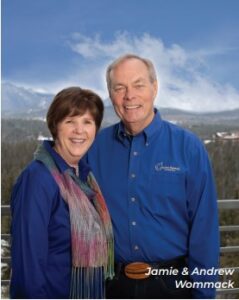
So the reason for prosperity, if you understand it correctly, isn’t so you can get a bigger house, a bigger car, or more toys. It’s so you can be a bigger blessing. I give away tens of thousands of books and materials and provide most of my teachings at no cost on my website to spread the Gospel and bless others. The greatest use of money isn’t for yourself. It’s so you can be a blessing to other people.
In Luke 16:10–12, the Lord says if you aren’t faithful over that which is least—talking about money—He won’t increase you and give you more. This is entry-level stuff. Trusting God with your money is a baby step of faith. It’s the very smallest area of trusting Jesus. If you can’t trust Him with your money, you’re deceiving yourself if you think you can trust Him with your healing, deliverance, marriage, kids, and so on. Be faithful in the least, so God can give you much!
I hope this teaching blessed you. If you’re hungry for truth, I encourage you to visit awmi.net for countless hours of free teaching and resources. Also, if you’re in need of prayer, just call my Helpline at 719-635-1111 to speak to one of my trained prayer ministers. They will agree with you for God’s perfect will in your life.
We love you,
Andrew & Jamie Wommack

As we age, we find it harder to find the time to volunteer to make our communities better. Seniors often feel they can no longer make contributions to help others. But this couldn’t be further from the truth. Volunteering doesn’t mean one has to give their time to build a school or serve meals to underprivileged communities on holidays; volunteering can be anything from reading a book to another person to maintaining a garden at a community center. Small and random acts of kindness go a long way to strengthen our relationships with the people that make our communities.
Volunteering Gives Seniors a Sense of Purpose
In a Bureau of Labor Report Statistics Report https://www.bls.gov/news.release/volun.nr0.htm that recorded volunteer activities across all age groups found that volunteerism in people between the ages of 55 and 64 years declined slightly from prior years when the study was released in 2015. This is surprising considering what we know about the impact that volunteering and giving back to the community has on seniors. It allows many to serve causes they are passionate about by giving them the chance to revisit the knowledge and skills they have developed over years and pass them on to younger generations. Volunteerism helps seniors interact with diverse groups of people that share their interests and beliefs. The communication between groups helps to improve surroundings and brings positive effects to the community. Many seniors report that they gain valuable people skills, such as kindness, patience, and resilience – that allow them to make new connections that help enrich their lives in numerous ways. Organizers need great leadership and experienced people can help share passions that can inspire others and help them grow and benefit from the expertise seniors bring. Even if you commit to a few hours each month, you will be making a huge difference. Many people do not volunteer because they have mental or physical challenges preventing them from doing so. The positive impact that volunteering and giving back to the community does to people outweighs the negative effects of living an isolated and sedentary life does. Getting up and out of your home can have positive effects on your mental and physical health. Even if you volunteer behind a desk or contribute to your community by giving the knowledge you have gained over the years, you are doing a great service to yourself and others.
Giving Back to the Community Helps Improve Mental and Physical Health
Mental and physical health is important in the way seniors feel about their lives after retirement. Volunteering and giving back to the community cause massive benefits for people over the age of 55 in many ways. According to a UnitedHealthcare 2017 study, www.unitedhealthgroup.com approximately 9 out of 10 seniors reported improved moods, nearly 8 out of 10 seniors reported lower levels of stress, and about 7 out of 10 seniors reported feeling more physically healthy. These numbers are similar for other age groups, but when there is so much concern over the well-being of seniors, it’s important to note the overall improvement volunteerism has on a group that is more at risk of feelings of isolation and depression. Seniors develop new habits, feel rejuvenated, and become motivated to help out in other ways, therefore staying active and living longer mentally and physically healthy lives.

Popular Volunteering Ideas Great for Seniors
Because some seniors may have health or mobility issues that prevent them from doing certain activities, people looking to volunteer and give back should consider ideas where they can stay safe while reaping all the benefits of getting involved:
• Be a Companion to Someone. Simply giving somebody company by talking and listening to them can uplift your and your companion’s spirits. Seniors can feel isolated and experience depression when they do not have others to socialize with. By keeping somebody company, you not only help yourself but provide a valuable service to another person.
• Teach a Class a Subject You Like. Many seniors like to spend their later years continuing to learn. If you have any teaching experience or enjoy teaching others about a subject you know a lot about, you can lead a class in a senior residence home or community center. Committing just one hour a week can be enough to keep you and others motivated to learn something new.
• Lead a Small Reading Group. If you are an avid reader and want to socialize with others that share this passion, you can lead a small reading group in any genre. Discussing works of fiction or non-fiction is a great way to stay mentally active and can help keep your critical-thinking ability sharp. The structured setting can also help motivate others to set and maintain goals.
• Fundraising and Donations. There are several organizations and charitable causes that rely on fundraising activities such as donor events and item sales. Whether it’s bakery, clothing, or artwork, there are ways in which you can help by checking people in, logging inventory, taking donations and making donations, and even being the face behind a message that promotes something you believe in.
How to Find Opportunities in Your Community
There are several ways to learn about volunteering opportunities in your community. Whether you are passionate about advocacy, animal rights, or helping the homeless, you can find a way to donate your time. You can visit your local community center to find numerous listings at schools, local government organizations, and even senior residence communities. You can also check the web for local opportunities that will keep you close to your home. A great place to start is to look at https://ourseniors.net/nonprofit/ which lists several non-profit organizations that are always looking for assistance. You can also learn about virtual opportunities, which is great because as we transition from quarantine due to Covid-19 you can stay safe at home if you are at a higher risk of contracting and spreading the virus. Thank you for checking out the OurSeniors.Net website, Facebook page, and blog. We are always providing you with informative content and encourage you to explore our other articles to learn more about the benefits of leading a healthier and more fulfilling life.

Alzheimer’s disease is one of the most devastating medical conditions affecting seniors today. As our population has aged, this threat has grown ever larger, affecting millions of seniors and their families. For years doctors have worked to find an effective treatment or even a clue to the exact cause of Alzheimer’s.
Now, it appears that the first real progress is coming. The drug, Lecanemab, has been shown to slow “cognitive decline” in Alzheimer’s patients. In a clinical trial covering 1,800 patients with early Alzheimer’s, the drug slowed the development of symptoms by about one-quarter. This is a modest effect, but it points the way to more effective treatments in the future. Importantly, it provides evidence that a naturally occurring protein is involved in Alzheimer’s disease.
Alzheimer’s patients have an abnormally high concentration of beta-amyloid protein in brain tissue. It is thought that the accumulation of this protein around brain cells damages them and leads to Alzheimer’s symptoms. Lecanemab interrupts this process, slowing the advance of symptoms like memory loss and lowered problem-solving ability. This is a very early stage of progress in finding a complete solution, but it is still very good news.
Here are some questions and key points you will want to cover-
• When will this treatment be available? U.S. drug regulators will give Lecanemab “fast-track” approval, moving it ahead of less important drugs. This is not a guarantee of a quick OK, but if all goes well, there could be limited-use approval early in 2023.
• Who should consider this treatment? Lecanemab is moderately effective if used in the early stages of Alzheimer’s disease. It limits the rate at which damage to brain cells occurs, but it cannot reverse existing damage. It will be for use in early-stage Alzheimer’s.
• How much benefit will a typical Alzheimer’s patient get from Lecanemab? This will vary from patient to patient. If the benefits of Lecanemab are sustained, experts think that a patient might have an extra year and a half of independent living before needing help to remain at home. As far from perfect as this is, it is still a benefit.

• How do patients take Lecanemab? Lecanemab is administered as an IV drip. It will likely be necessary to go to a clinic or hospital to receive the drug. In the study cited above, doses were given at 2-week intervals.
• Are there side effects to Lecanemab? Yes, there are, and some are serious involving symptoms like brain swelling. However, most side effects can be handled. Because of the side effects, doctors will carefully choose patients for this treatment.
• Who makes Lecanemab? It is being developed by Eisau, a Japanese company along with Biogen, an American researcher.
• What about the cost? Lecanemab is one of the class of drugs known as monoclonal antibodies. These drugs are expensive to develop and make, so you can count on a high price. It is likely that Medicare and Part D plans will limit coverage to preapproved cases. You must balance this against the very high cost of years of Alzheimer’s disease and memory care. Count on the staff at OurSeniors.Net, your go-to magazine for seniors, to keep you informed.
• It is hoped that this first breakthrough in treatment will lead to a long line of new drugs that are safer, more effective, and easier to take. This is how progress starts- a modest improvement leading to better understanding and finally a complete solution.
Meanwhile, here is important news for seniors- according to the Centers for Disease Control, you can reduce your risk of Alzheimer’s by making healthy lifestyle choices. Preventing and managing high blood pressure, controlling blood sugar, keeping a healthy weight, stopping smoking, and being physically active are all associated with a lower risk of Alzheimer’s. Physical activity can improve thinking, reduce the risk of depression and anxiety, and help you sleep better.
Do not drink excessively and correct hearing loss promptly. Make sure to talk to a hearing care professional to treat and manage hearing loss. OurSeniors.Net recommends one of our partners, Rx Hearing. Click on the link to learn about their excellent services.
Thanks for reading our blog and have a great day. Hope and help are on the way!

We are now in the middle of Medicare’s Open Enrolment Period, and seniors are inundated with ads for competing plans. How can a senior evaluate those competing plans and what they offer? This is a key decision that may affect a senior’s life in fundamental ways, so choose carefully.
First, remember some basic facts. There are two main ways to get Medicare coverage: Original Medicare and Advantage Plans, also called “Part C.” An Advantage-type plan is a Medicare-approved plan sold by a private company that offers an alternative to Original Medicare. Advantage plans bundle Original Medicare Part A (hospital insurance), Part B (doctor visits, labs, etc.) and usually Part D (drug coverage).
Advantage plans may have lower out-of-pocket costs than Original Medicare, but they require you to use doctors and other medical providers who are in the plan’s network. Advantage plans may also offer some extra benefits that Original Medicare doesn’t cover — like vision, hearing, and dental services. All Original Medicare supplemental plans are the same if they have the same plan letter designation. However, Advantage plans can vary widely from one seller to another, and there can be big differences in the quality of care and patient satisfaction. How can a senior determine which of the many Advantage plan offerings has the best track record?
Fortunately, the Medicare system itself offers some help. The Centers for Medicare & Medicaid Services (CMS) publishes the Medicare Part C and D Star Ratings each year to measure the quality of health and drug services received by beneficiaries. This rating system provides Medicare beneficiaries with meaningful information about the quality of care and the cost of plans available to them.
Medicare uses a Star Rating System to measure how well Advantage and Part D plans perform. A plan may receive from one to five stars, five being the highest rating. These scores are based on how well plans perform in several categories, including quality of care and customer service. These scores are released each year and reflect performance over the preceding 12 months. Remember that a plan’s performance may change from year to year. Advantage Plans are rated on how well they perform in five different categories:
• Plan responsiveness and care
• Health plan customer service
• Member complaints, problems getting services, and choosing to leave the plan
• Managing chronic (long-term) conditions
• Staying healthy: screenings, tests, and vaccines
Part D plans are also rated on how well they perform in different areas, including customer service, member complaints, choosing to leave the plan, drug pricing, and patient safety. Use the star rating to compare performance among different Advantage plans. When you consider a plan’s star rating, make sure the plan’s coverage and costs suit your needs. If you are considering a Part D plan, be sure the plan covers the drugs you are taking at a suitable cost. For an Advantage plan, look carefully at the physicians, hospitals, and other providers in the plan’s network.
You may have heard that 5-star ratings have been harder to come by this year. It is true, the number of 5-star rated plans for 2023 is lower than it was in 2022. This is due in part to changes in rules that were applied to the special circumstances of the pandemic. Those rules have now been tightened and the standards may be higher, thus fewer Advantage plans meet them. The CMS reports that 51% of Advantage plans with drug coverage will have a four-star rating or higher in 2023, a drop from 68% in 2022.
There is a simple way to find highly-rated Advantage plans available in your area. Go to the Medicare Administration’s website at www.medicare.gov and enter your zip code. Use the dropdown box to filter the results by star ratings and you will see a list of plans that meet your criteria. If filtering for only five-star plans yields no available results, try filtering for “four and up.”
Thanks for reading the OurSeniors.Net blog and our magazine for seniors. We strive to cover important news for seniors and all aspects of living in Florida. Senior housing news, the pros and cons of living in Florida, and just plain fun are our favorite topics, so keep tuning in!



Have you thought about your credit score lately? Some seniors assume that because they are not going to make any more big-ticket purchases, there is no longer any need to worry about their credit scores. This is a mistake. Even if a senior never takes out a new mortgage or finances a car, credit scores are still an important matter. Reductions in your credit score could lead to higher costs for auto and homeowners’ insurance.
A simple transaction like getting a modem from your cable tv provider may involve a credit score check. A more serious concern could be unexpected difficulty in moving into a senior housing or retirement community. A bad credit score could make you ineligible or require a substantially higher security deposit. A poor credit score could even affect a senior’s employment status if they are seeking a new job. In short, seniors should pay attention to their credit scores and take care to maintain them at the highest level possible. It is a common myth that simply being retired will reduce your credit score.
The credit reports used to determine your credit score do not contain any information about your work status or income. Instead, credit reports record your history of borrowing and paying back. This history includes loans like home mortgages and car loans as well as credit card purchases. Companies that issue routine bills (electric, water and gas utilities) also report credit data. Major events like foreclosures, bankruptcies or repossessions are also included in this record.
These records are subject to time limitations. In most cases, negative events are deleted from credit reports after 7 to 10 years, and records of loans and payments include only events of the last 10 years. If a senior had a bad credit experience as a young person (over 10 years ago), this information should not be on their credit record today. Here are a few need-to-know facts about credit scores:
• There are 3 credit reporting agencies: TransUnion, Equifax, and Experian. They all collect and maintain information on credit records.
• Seniors should check their credit reports regularly. If you find errors on your credit report, take steps to correct them.
• You are entitled to a free personal credit report from each of the agencies once a year. To learn more, go to AnnualCreditReport.com. Those are the basic facts, but how does a senior go about maintaining a good credit record?
The first step is to take advantage of the free annual report mentioned above. Make certain that the information contained in each of these reports is correct. After that, understand the difference between “credit reports” and “credit scores.” Based on the data in the credit report, each of the three agencies gives the person a credit score. This score is typically represented in a “FICO” number ranging from 300 to 850; the higher the score, the more a person is creditworthy. Seniors should be happy to learn that people 60 years old and above have the highest average FICO score (749).
By the way, “FICO” is a trademarked name owned by the Fair Isaac Corporation, the company that created the system. There are some things a senior should do to keep a high FICO score or to strengthen one that needs some work. These are the same measures that any person should take, but seniors have some special circumstances. Since seniors already have a lengthy credit history, they probably have less need for some types of credit and are more settled in their circumstances. On the other hand, seniors probably have lower incomes and are more likely to face expensive emergencies like medical problems.
Payment history is the most important factor in determining a FICO score, so be sure to make all payments on time. This includes repetitive payments to utilities and other monthly expenses as well as bank credit cards, auto loans or mortgages. Be sure to mark those due dates on your calendar, making even small payments on time. If you are unable to make an on-time payment, contact the creditor or seek financial help. The number of open accounts can affect your FICO score.

It may be a good idea to close unused accounts. FICO computers look at the total amount of credit you have available, compared to the ability to pay it off. An open account, even with no owed balance, makes this ratio look weak. Resist offers to open new accounts like, “Ten percent off today’s purchase if you open a credit account today.” The total amount owed is another important factor in FICO scores. If you can do so, paying down existing debt will increase your FICO.
However, think carefully before doing this as some debt, especially home mortgages, may have been issued with very favorable terms. It makes sense to pay off high-interest debt like credit cards before reducing low-interest loans like home mortgages. All of this is good advice, but what should a senior do if they are having difficulty making a payment that is due soon? One of the OurSeniors.Net family of trusted partners, BMG Money, is there to help with good advice, counseling, and a loan that is affordable and quickly available. BMG offers several special programs aimed at retirees. Instant funding is often available.
Many borrowers get their loan proceeds deposited in their bank accounts on the day of loan approval. A BMG Money loan can help to build your credit history, offering a competitive interest rate with affordable and automated payment plans. For more information about BMG Money or to apply for loans online, visit the company’s website https://www.bmgmoney.com/. Client support is available Monday through Friday, 8:00 a.m. to 7:00 p.m. Eastern Standard Time at 800.316.8507. All loans offered are subject to eligibility, underwriting and approval. Terms and conditions apply.
Thanks for reading our blog. OurSeniors.Net strives to be the best possible online senior magazine, bringing you useful information about senior living Florida and all-things senior. Have a great day!
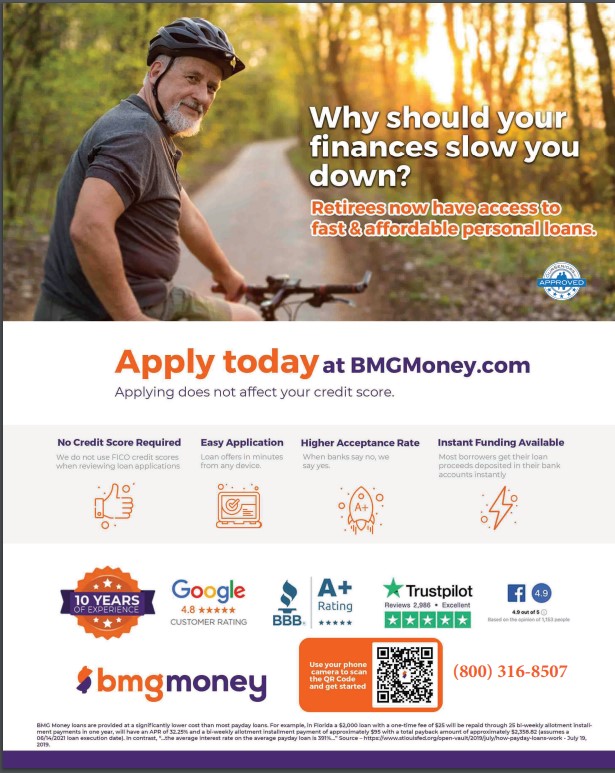

It is a sad fact that at this point in human history there is no cure for the effects of growing older, and most of us are going to need assistance as our minds and bodies age. There are two ways of dealing with this event; wait until it happens and plan in a crisis mode, or plan while you are healthy and better able to dictate what you want to happen.
Planning is always the recommended strategy. That means doing some basic estate planning and possibly some advance-care planning. A basic estate plan consists of 4 documents: a will to direct your heirs about how you want your estate distributed; a durable power of attorney to appoint someone to manage your legal and financial affairs when you cannot do so yourself; a designation of health care surrogate to appoint someone to talk to your doctors and make medical and other care decisions for you when you cannot do so for yourself; and a living will to memorialize your decision regarding end-of-life care, such as whether or not a feeding tube, ventilator, or other artificial methods should be used to sustain your body when you are at the end.

Advance-care planning seeks to figure out how to pay for long-term care if it is
needed down the road. One option is long-term care insurance which is a good choice for
avoiding Medicaid and opens up the selection of long-term care facilities to include those
that are private-pay only. The other option, when private-pay is not feasible, is planning for
Medicaid eligibility.
Planning for Medicaid means planning to meet its eligibility requirements. For
individuals, that means around $2,000 in assets and $2,500 in income. Married persons can
have more assets and income, especially if only one spouse is looking to qualify for benefits,
but the levels are still fairly low for most people.

If only one spouse will need care, a practical strategy is to transfer all the assets to
the well spouse who then refuses to pay for the ill spouse’s care. The important part of this
plan is to make sure the well spouse has a will or trust that keeps the assets out of the ill
spouse’s name if the well spouse passes first.
Another useful strategy is an asset protection trust, which can be used by individuals
or married persons. All assets that would otherwise count against Medicaid eligibility
get transferred to the trust. The grantor may retain the right to income from the trust but
must give up all other rights to the trust assets, including any right to manage those assets.
The gift to the asset protection trust starts the clock running for Medicaid eligibility so that,
after 5 years, the gift will not count against the grantor.
In many cases, however, advance planning is not possible because the need to find
care is imminent. In those cases, we look at all available options, including military veteran
benefits, emergency spend-down plans, and qualified income trusts for persons with too
much income to qualify for Medicaid. For families facing a crisis-planning situation, it is
critical to seek professional advice because medical or non-legal personnel may not be aware
of all the options you have.
Most of us will need help of some kind in our senior years, including help with
paying for the help. Consult with your elder care attorney to find a strategy that gets you or
your loved one the care you need without having to spend everything on the cost of that care
and having nothing left over for your family.

At OurSeniors.Net we think all our seniors are truly amazing. Let’s look back at a selection of those we have highlighted in the past months.
Lowell Ward- 95, Going Strong, and Still a Collector of Great Experiences and Memories
If you have read about our “Greatest Generation,” you know the story of men like Lowell Ward. Lowell lived through the Great Depression, joined the Navy at a young age, served our country on a submarine, went to college on the GI Bill, and then married “the prettiest girl in town” (recommended by his sister). Together, Lowell and Suzanne raised three sons and saw the birth of twelve grandchildren and great-grandchildren.
After working for the state of Minnesota for years, Lowell and Suzanne heard the call of Florida sunshine. After completing a master’s degree at FSU, they settled first in south Florida, then in the Villages. Today Lowell is a collector of newspapers that mark famous events. His life is an example of a great event- the lives of our “Greatest Generation.”
Colonel Juan Armando Montes- One of America’s Best
Seniors may remember the 1966 hit song, “The Ballad of the Green Beret.” That song’s lyrics and the John Wayne movie, “Green Berets” call to mind the amazing life of Colonel Juan Armando Montes. That life began in pre-revolutionary Cuba, where Juan appeared to be destined for a scholarly career. He graduated cum laude from college and then earned his Juris Doctor degree. The Cuban Revolution ended those plans, as he fled from Communist Cuba to the United States.
It was a traumatic event, but America welcomed freedom-loving Cubans. Juan Armando Montes became a distinguished soldier and officer in the United States Army. He spent 30 years in the military, 25 as part of the Green Beret Special Forces. Throughout his life, Colonel Montes demonstrated the courage and integrity that made America great. That is why he is one of today’s Amazing Seniors!
Ana Margarita Menéndez and Connie Ramirez- “Living the American Dream with a Cuban Accent.”
These two talented ladies personify some of America’s best stories. They are the stories of great people who made this country their new home, worked hard, and succeeded brilliantly. Anna and Connie were important cast members on the pioneering TV show, “Que Pasa, USA?”
In the late 1970s, Miami station WPBT came up with a great innovation- a bilingual sitcom. The show was titled “Que Pasa, USA?” and it quickly became a big hit in Miami and national syndication. Today, Ana and Connie have moved on to careers in public relations and specialty voice work. Over 40 years have passed, but Ana, Connie, and “Que Pasa” are still fondly remembered for the humorous, sympathetic portrayal of Cuban Americans. Thank you, Ana and Connie. Cuba’s loss was America’s gain!
Jerry and Esther Krueger- Good Things Come in Pairs
America has been blessed to have both men and women who contributed to its greatness, its “Greatest Generation.” Jerry and Esther Krueger are examples of these Amazing Seniors, two people who helped fight and win World War II, settled down, and built the nation we know today.
After 72 years of marriage, the Krueger family can look back on successful careers in law, politics, and education. At the same time, the couple raised three children and now have a total of thirteen grandchildren and great-grandchildren. Following very successful work and community lives in New Jersey, the couple moved to Daytona Beach and helped to found WISE, the Wisdom in Senior Education program at Daytona State College.
Jerry and Esther are now in their 90s and still doing good things. That Greatest Generation just keeps going!
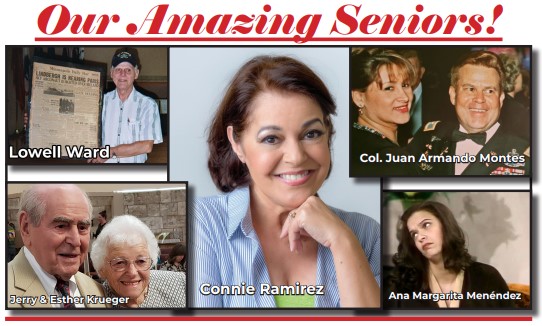

The decision seniors and their loved ones must make about whether it’s time to transition to an assisted living care facility or a nursing home facility can be difficult. At its best, many seniors find this choice uncomfortable; while at its worst, others will find it stressful. Seniors are accustomed to their independence and can overlook or ignore deteriorating mental and physical health, as well as other factors like personal hygiene, isolation, safety, and managing daily tasks.
Deciding whether it’s time to move into an assisted living care facility or a nursing home facility is much easier when seniors have a support group made up of family members, friends, and health professionals. Seniors should start having this discussion with their support group early to learn as much as possible about the quality of care between the two types of services as they relate to their individual mental and physical health needs. This will make evaluating facilities much easier and facilitate the decision-making process.
Living in an Assisted Living Care Facility
A resident in an assisted living care facility receives a level of support that allows them to remain as independent as possible. Residents in assisted living care often have spacious, individual rooms, shared quarters and private residences with weekly housekeeping and linen service. They also have access to assistance with daily living activities that are coordinated by a full-time lifestyle director or assistant director. Licensed nurses are available 24 hours a day, 7 days a week.
Some of the most common activities in an Assisted Living Care Facility include classes, field trips, lectures and workshops. Residents also have access to onsite fitness centers, wellness programs and restaurant-style dining where they can choose from select menus that change each day.
Assisted living care facilities usually offer temporary or long-term care facilities when independent senior living has become difficult. These services are typically offered by the State Department of Health and are fully licensed and regulated to ensure the rights of seniors are respected and they are given the appropriate level of care to maintain their mental and physical health.
One of our most trusted partners is Majestic Gardens in South Daytona, FL, under the supervision of Dr. Regina Asihene. It’s a 16-bed assisted living facility that provides residents with unique living experiences tailored to the specific needs of its residents. Staff is available round-the-clock and are responsible for all the residents’ daily needs like housekeeping and laundry. Medical services such as physical exams and lab tests are provided on-site which makes it a great choice for residents requiring constant medical attention. Take the time to schedule a tour by calling 386-243-9993.
Living in a Nursing Home Facility
Nursing home facilities, also referred to as skilled nursing facilities, provide a wide range of personal and health care services. Their focus is on medical care and provides more assistance for its residents than assisted living care facilities. These services usually include 24-hour supervision and nursing care, three meals a day, and assistance with everyday activities, including bathing, dressing, grooming, medication management and several rehabilitation services like breathing, occupational, physical and speech therapy.
Some seniors stay in a nursing home facility for a short time after spending time in the hospital to help them recover, after which they are discharged and allowed to go home. However, most residents in a nursing home facility live there permanently because of ongoing mental or physical conditions that require 24/7 care and supervision.
Nursing home facilities have more of a clinical environment where residents usually live in a private or semi-private room that does not include a living and kitchen. Seniors receive limited recreational activities and when they do participate in them, they are under the supervision of the nursing staff. Seniors that can no longer maintain their independence are often admitted to nursing care facilities because of the level of round-the-clock assistance of skilled nurses who can address the needs of residents quickly.
What OurSeniors.Net is All About
When we work together to keep the people living in Florida enjoying their senior lifestyle, we know we’ve made accomplishments and continue to contribute through our senior online and print magazine. The OurSeniors.Net team has been bringing informative and entertaining content to our subscribers since 2016.
Have you seen the English and Spanish edition of our print magazine for seniors? We’ve started with our Southeast Edition serving the Miami-Dade, Broward, and Palm Beach counties, and have expanded our English & Spanish edition to the Northeast Florida Edition serving Nassau, Duval, Clay, Putnam & St. Johns counties, as well as a Spanish edition serving Volusia County in our Central Florida edition. We hope to expand to other regions in the future, but we need your help. Visit our website to subscribe to our quarterly lifestyle magazine and be sure to follow us on our social media channels, including Facebook, LinkedIn, and YouTube.
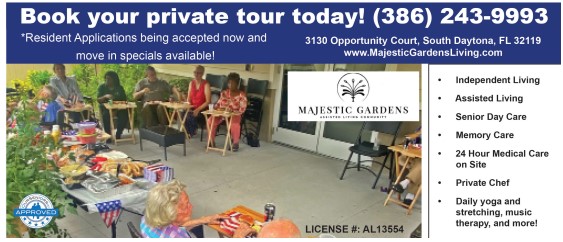

When you want to change your dietary habits with the best intentions to get healthy, you might find modifying your eating routines challenging. There are several fad diets we learn about from television, magazines, and the internet. Often a diet that works for one person won’t work for another person. This leads to people trying several different diets for short periods, becoming more frustrated and discouraged with every failed attempt at finding the best option. This is the sort of confusion our senior magazine strives to address. We’ve researched three of the most popular diets out there and provided a little background information so that you can make an informed decision when selecting the diet that may be right for you.
What is the Paleo Diet?
This is a diet based on what prehistoric humans likely ate 2.5 million to 10,000 years ago when humans spent their time hunting and gathering food sources such as fruits, vegetables, lean meats, fish, eggs, nuts and seeds. The Paleo Diet discourages eating foods that became readily available when small-scale farming techniques began about 10,000 years ago which included grains, legumes and dairy products. The Paleo Diet stems from the idea that people should eat the same foods as early humans because our genes have not caught up to the modern diets that grew out of farming, as well as the processed foods we find in supermarkets and convenience stores. Supporters of this diet suggest that current eating habits outpaced evolution and our ability to adapt to modern times, leading to illnesses such as heart disease and diabetes, as well as obesity. Switching to this diet is beneficial to the senior lifestyle because it provides high levels of essential nutrients with few to no empty calories. Seniors need to get just as many essential nutrients as their younger selves but should be getting them in less food.
What is the Vegan Diet?
This is a plant-based diet where people do not eat meat, fish and poultry, as well as foods that come from animals, including dairy products and eggs but stick to food sources like vegetables, fruits, and grains. The Vegan Diet became popular in the 2010s but is believed to have been practiced across numerous cultures for about 2500 years. Many chain restaurants, supermarkets, and specialized smaller markets began to market vegan options as a healthy alternative to eating animal products for health, ethical, environmental and religious reasons. But there have been numerous studies that suggest that people could be at risk for deficiency of essential nutrients and need to monitor their dietary intake and take supplements when necessary. Health professionals believe that people that switch to a strict Vegan Diet may be lacking in vitamins B-12 and D, iron, calcium, protein and omega-3 fatty acids and should consider taking supplements. There are several health reasons people switch to veganism: processed meat, fish, and poultry as well as their byproducts are farmed for mass consumption. This means that many seniors can be putting potentially harmful chemicals into their bodies. People must be aware of the potential risk of nutrient deficiencies before making the switch and do their due diligence in monitoring their health throughout.
What is the Mediterranean Diet?
Despite this culturally inspired diet having been around for a long time, it’s not a strict diet in the sense that there are hard-and-fast rules. It’s a lifestyle choice that utilizes ingredients eaten by people living around the Mediterranean Sea. It incorporates minimally processed foods and opts for mostly plants instead of red meat and encourages the use of flavors from herbs and spices to enhance meals. The U.S. News & World Report recently ranked the Mediterranean Diet as one of the healthiest ways for adults to eat across four categories, including Best Overall Diet, Best for Healthy Eating, Easiest to Follow, and Best Plant-Based Diet. In the last half-century, there have been numerous studies that show that people who follow this diet tend to live longer and have much lower rates of cardiovascular disease. Is this the right diet for a senior lifestyle Florida? Following a diet that is low in red meat, processed sugar, and saturated fats significantly lowers the risk of many health conditions, including diabetes, heart disease and cancer, all of which are big health concerns for elderly people. Research has shown that a Mediterranean Diet also has a positive effect on gut and brain health.
Which One is Best for You?
A certified nutritionist can guide you through the misinformation and can recommend the diet that is best suited for your health needs, physical needs, and lifestyle. A nutritionist can also provide ongoing support, encouragement, and accountability. If your healthcare plan or insurance does not cover the services of a certified nutritionist without a doctor’s referral, you can consult with your primary care physician to get some useful information to help you get started. You should always run dietary changes to your physician to ensure your choices do not conflict with your body composition, medications or overall health. Our team at OurSeniors.Net strives to provide useful and entertaining information to enhance the quality of life for seniors and retirees. Check out our senior living magazine online for more informative content on a variety of subjects. You can also subscribe to our quarterly lifestyle magazine and follow us on our social media sites, including Facebook, Pinterest, LinkedIn, and YouTube. Help keep OurSeniors.Net going strong by donating to our cause at OurSeniors.Org/Fundraiser.


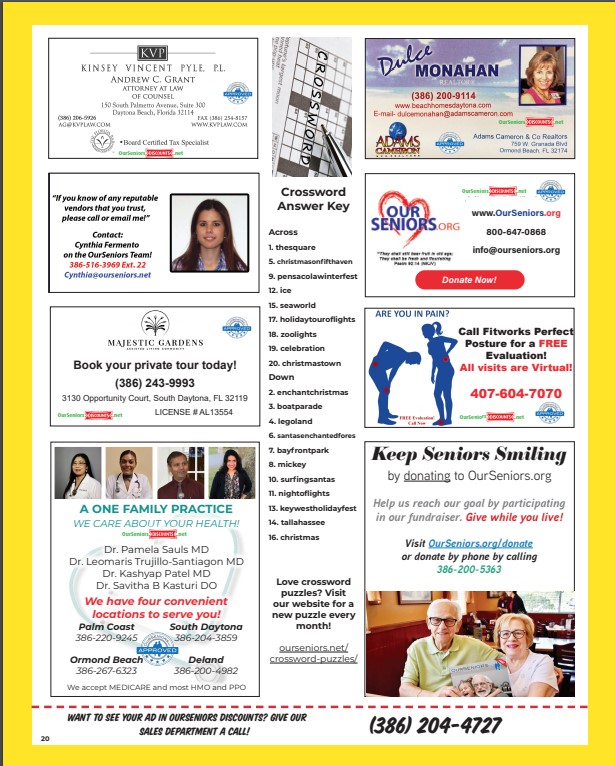
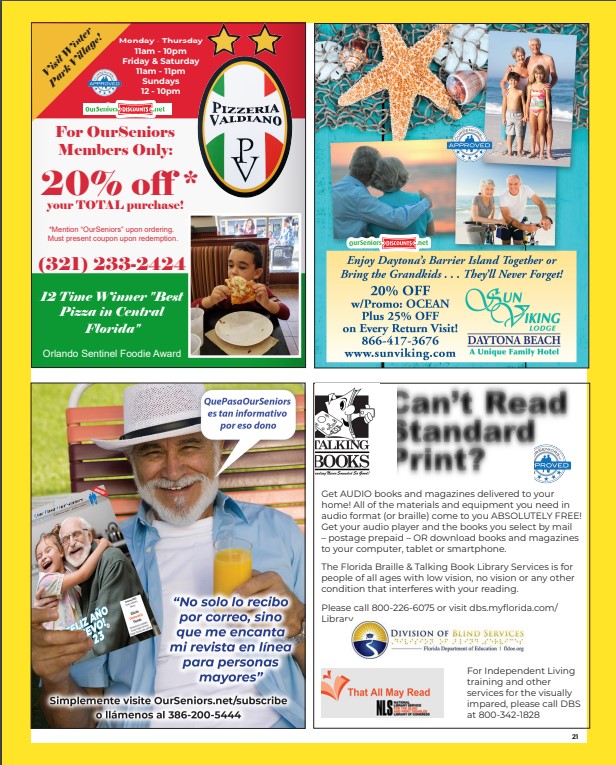

Our mission at OurSeniors is to be the go-to resource for senior citizens in Florida that will research the right vendors for any service. We want to make sure that seniors are not ripped off by people who take advantage of the vulnerable. If we can help even just one person, we are happy. Knowing that we diverted a bad situation, which has happened many times, is what keeps us growing and expanding our services around Florida. We are now in 25 counties with a distribution of more than 130,000 and have an online presence with an even larger reach.

If you are a donor with OurSeniors, you know that we provide a variety of resources with advice from professionals like doctors, dentists, contractors and other experts in their fields. Our magazine and website provide articles free of charge and we also have an email newsletter that includes newsworthy items and advice. Our Brunch & Learn events have panel discussions with individuals who are knowledgeable in what they do and want to give free information to seniors. There are many outlets where you can find information and we enjoy providing it.

OurSeniors.org also works to assist seniors by visiting those living in nursing homes and providing immediate and continuing care and comfort for those that are isolated. Knowing that only 5 to 10 percent of all seniors in nursing homes, rehabs and assisted living facilities receive visitors, the team tries to change this by gathering gifts, blankets, jackets, stuffed animals and cookies to make them feel cared for.
Any donation would help us tremendously as we continue to produce the magazine and provide free resources to seniors across Florida.
Please visit www.ourseniors.org to see more about what you can do to help or call at 800-647-0868.
